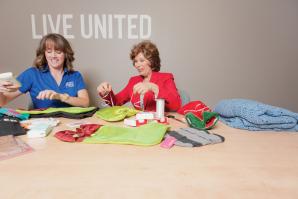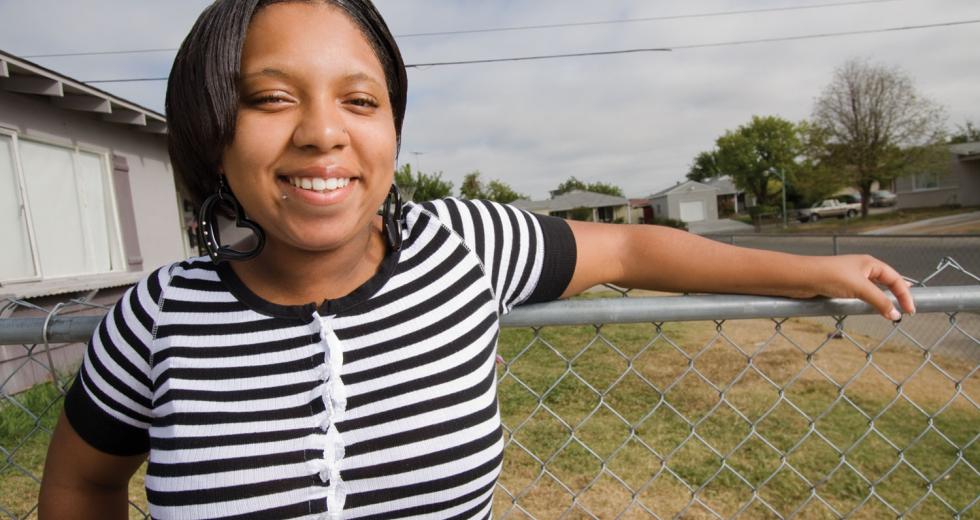After 19 years of struggling to belong, Juanita Nicolas found the students at Wilson Riles Middle School. As a youth aid, the teenager tutored 40 students, many in the foster care system just as she had been before emancipation a year earlier.
Miss Juanita, as the students call her, entered the foster care system at age 4 along with her six brothers and sisters when her parents were arrested for dealing drugs. Police found her living in a home infested with ants and rats. “I thought everyone lived like that,” Nicolas says.
After a few unwelcoming placements, Nicolas and two of her brothers found a home with a family that raised her from age 6 to 18. Although she was saved from her birth family’s living conditions, it was difficult to be away. “I was devastated because I was separated from the rest of my family,” Nicolas says. “Why do other children have parents and I don’t?” Even when friends complained about their parents, she says, at least they had parents to complain about.
The Sacramento High School student had ongoing anger. She fought at home and at school. She was eventually diagnosed with post-traumatic stress disorder.
“We fought a lot,” Nicolas says of her relationship with her long-term foster mother. But looking back, she says the woman really loved her and was just trying to help. “She took me in when no one else would.”
At 18, two days after high school graduation, she was kicked out of her foster home at 9 p.m. with no place to go. Her father was in jail and so were other family members. The only time she had seen her mother, the woman asked to borrow money. “That was when I realized that I had to take care of myself,” Nicolas says.
Then she had a life-changing experience. She started working as an aid through the Youth Investment Center. The program is funded by AmeriCorps with matching grants from the Child Abuse Prevention Council of Sacramento, thanks to the support of Women in Philanthropy.
“I know what these kids are going through,” Nicolas says. “They remind me of me.” When a 13-year-old girl started to get sassy with Nicolas, she laid down the rules, which included being respectful and putting in 100 percent effort.
“I can’t help anyone who doesn’t want to be helped,” Nicolas says, “But at the same time, I’m not going to sit and let these kids fail. Not if I can do something about it.”
Nicolas says she’s found a place where she belongs. “The experience made me grow up. Now I am buying my own clothes, insurance and car,” she says. Nicolas says she hopes to serve a second term in the program and has plans to begin the nursing program at American River College.
Sara Fung, program manager for the Child Abuse Prevention Council of Sacramento, says the program, which has been in place for five years, provides former foster youth with training and leadership experience while giving current foster youth role models. “At the end of the year, I can really see a difference in the students and the counselors,” Fung says.
The number of youth aids funded each year often depends on the economy. Last year Nicolas was one of 39. “We try to help as many as we can afford,” Fung says.
Nicolas says there is still much work to be done in the foster system. It would benefit from better screening of foster parents and some kind of a transition program for emancipation. Temporary housing with help on resume and job skills could bridge the path to adulthood. “I know resources are out there, but a lot of people in that situation don’t know about it,” she says.
Nicolas would also like to hear more voices advocating for foster children because they are often afraid to speak up. “We aren’t dogs,” she says.
And what advice would this youth aid have for her younger self? “There is nothing you can’t do,” she says. “I gave up on me. I once tried to kill myself,” she says. “Now everything I go through in my life makes me stronger.”
Recommended For You

Making Cents
Preparing foster youth for their financial future.
For many foster youth, establishing stability within in the foster care system is exceedingly difficult. But it’s after emancipation that the realities of financial independence become even more challenging.

Sister, Mother, Mentor
In 2001, a group of local businesswomen put their heads and dollars together, hoping to make an impact on the lives of Sacramento foster youth.



